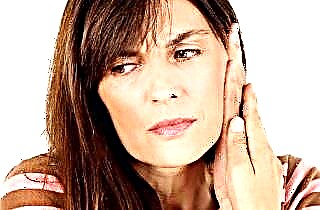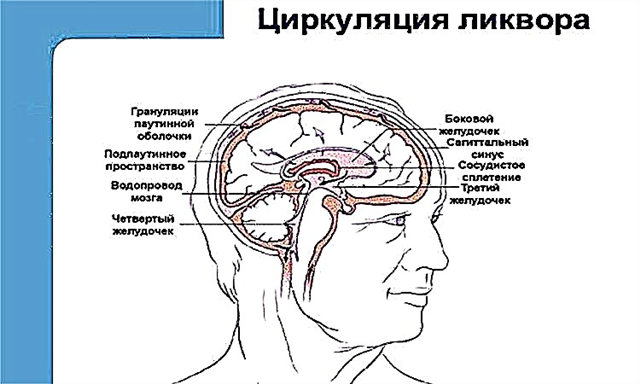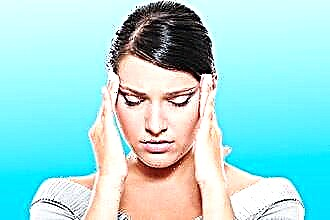Ringing tinnitus - both unilateral and bilateral - appears in a variety of situations. It is not always due to the pathology of the organ of hearing only and can be a manifestation of various diseases of the cardiovascular, nervous, endocrine systems. In some patients, this symptom is associated with the influence of occupational hazards - for example, industrial noise or toxins. Many provoking factors and diseases accompanied by ringing, determine a large number of assumptions about the etiology of noise, make it difficult to quickly and accurately diagnose. If the ringing in the ear does not go away on its own, you need to immediately find out what it is associated with.
Causes
 Tinnitus in silence interferes with sleep and rest. The intrusive sound annoys the patient and raises legitimate concern about a possible disease provoking the noise.
Tinnitus in silence interferes with sleep and rest. The intrusive sound annoys the patient and raises legitimate concern about a possible disease provoking the noise.
Both adults and children can complain about this symptom. Sometimes ringing noise is mistakenly perceived as a pathological sign that is present only in the elderly, while changes in the elements of the sound-conducting and sound-receiving system are observed in patients of all age groups.
What does ringing in the ears mean?
This largely depends on the main characteristics of the symptom (time of onset, duration), the presence of concomitant manifestations (pain syndrome, etc.). If the ringing noise appears once and quickly disappears on its own, this may be due to short-term exposure to loud sound (for example, after listening to music with headphones). Frequent recurrence of tinnitus episodes or persistent tinnitus is an alarming sign.
Many patients wonder if there is a cure for tinnitus. You should be aware that there are no special pharmacological preparations designed to affect this symptom. The choice of treatment regimen depends on what is causing the noise - sometimes even surgery may be required. However, in the complex therapy of diseases accompanied by ringing noise, agents belonging to the groups of nootropics, vitamins, antiplatelet agents, anxiolytics, etc. are used.
What makes your ears ring? The likely causes for ringing in the ear are:
- Meniere's disease.
- Hypertonic disease.
- Barootitis.
- Occupational hearing loss.
- Sudden deafness syndrome.
- Labyrinthotoxicosis.
- Acoustic trauma.
- Ear labyrinth contusion.
The appearance of ear noise is observed in hypertensive patients during an increase in blood pressure.
 At the same time, ringing is not the only possible variant of subjective sound. Ringing in the ear for a long time with Meniere's disease. The etiology remains unknown; of great importance in the development of pathology are endocrine disorders (in particular, pathology of the thyroid gland, adrenal glands), a tendency to allergic reactions, dysfunction of the autonomic nervous system, degenerative changes in the cervical spine. Severe ringing in the ears is one of the most persistent symptoms. Although the course of the disease is paroxysmal, patients may indicate that ringing in the left ear or on the right side is constantly present. Characterized by the occurrence of noise first in one ear, then in both.
At the same time, ringing is not the only possible variant of subjective sound. Ringing in the ear for a long time with Meniere's disease. The etiology remains unknown; of great importance in the development of pathology are endocrine disorders (in particular, pathology of the thyroid gland, adrenal glands), a tendency to allergic reactions, dysfunction of the autonomic nervous system, degenerative changes in the cervical spine. Severe ringing in the ears is one of the most persistent symptoms. Although the course of the disease is paroxysmal, patients may indicate that ringing in the left ear or on the right side is constantly present. Characterized by the occurrence of noise first in one ear, then in both.
Barootitis occurs as a result of a drop in atmospheric pressure.
One of the most common forms of barootitis is aerootitis - the popularization of the use of air transport for travel has led to the emergence of a separate variant of the disease. The patient says that the ear is blocked and ringing. The risk of developing pathology is much higher if at the time of pressure change (with a sharp decrease in the plane or, conversely, a sharp rise), there is a pronounced nasal congestion (as a result of infectious, allergic rhinitis or rhinitis of a different etiology).
If your ears ring, what does it mean with constant contact with industrial noise? The damaging effect of loud sound of different tonality has been known for a long time. To prevent the development of occupational hearing loss, enterprises use special headphones and other protective devices to reduce the noise level. However, in many cases, hearing loss cannot be avoided, and the first sign of hearing loss is a gradually increasing constant ringing in one ear or on both sides.
Labyrinthotoxicosis
Labyrinthotoxicosis is understood as damage to the ear labyrinth as a result of intoxication with household and industrial poisons and drugs. If the patient's ear rings, this may be due to poisoning:
- mercury compounds;
- methanol;
- quinine;
- salicylates;
- streptomycin, neomycin.
 Ear murmur is only a part of the clinical picture of each type of intoxication.
Ear murmur is only a part of the clinical picture of each type of intoxication.
The rapid development of labyrinthotoxicosis is observed with an overdose of quinine. Patients note that the ear rang sharply, hearing acuity decreased. The left and right ear are affected to varying degrees, so the murmur may be one-sided at first. Currently, quinine is rarely used as a medicine.
Salicylates provoke the appearance of noise with prolonged use - if it rings in the right ear, you need to think about the connection with pharmacological drugs.
This group of drugs is used as analgesics and antipyretic drugs, the most famous representative is acetylsalicylic acid (Aspirin).
Streptomycin and Neomycin are antibacterial agents of the aminoglycoside group. Preparations of the aminoglycoside series have an ototoxic effect, therefore they cannot be taken without clearly justified indications - especially in childhood.
Acoustic trauma
Injury resulting from exposure to sound stimuli is defined as acoustic trauma. She may be:
- sharp;
- chronic.
Chronic acoustic trauma is said to be when a patient with hearing loss has been exposed to external noise for a long time. One of the variants of this pathology is hearing impairment as a result of contact with noise in the workplace. In addition to occupational hearing loss, disorders associated with the influence of external noise during rest and sleep in everyday life can also be distinguished. They occur in people living near "noisy" objects - railways, large enterprises. It is also necessary to take into account the frequent use of headphones, listening to music at high volume - this can provoke ringing in the ear and congestion.
The most dangerous are "vacuum" earphones and "earbuds" or "earbuds".
 The reason for the development of acute acoustic trauma is a sudden impact on the hearing organ of high-power impulse noise. Pathology occurs as a result of an explosion or a shot, it is characterized by a sharp ringing in the ears. In acute acoustic trauma, ringing can be both unilateral and bilateral.
The reason for the development of acute acoustic trauma is a sudden impact on the hearing organ of high-power impulse noise. Pathology occurs as a result of an explosion or a shot, it is characterized by a sharp ringing in the ears. In acute acoustic trauma, ringing can be both unilateral and bilateral.
When the ears are ringing and popping, one can think of a combination of acoustic and barometric trauma. Barotrauma occurs with a sharp change in atmospheric pressure, which was already mentioned in the previous sections when discussing aerootitis.
It can be observed during rapid ascent from depth, while in the aircraft cabin.This type of damage is also noted in explosive trauma - the patient's ear sharply lays down and the ringing becomes the dominant sound, while external acoustic stimuli are not perceived.
Sudden deafness syndrome
The exact etiology of sudden deafness syndrome has not been established. Among the assumptions about provoking factors are the following:
- damaging effects of low or high temperatures (hypothermia, hyperthermia);
- neuritis of the auditory nerve, flowing latent;
- emotional stress, stress;
- physical stress, etc.
Researchers have found that impaired blood supply to the snail plays a key role in the pathogenesis of the disease. The noise appears suddenly - the patient has a strong ringing in his ears, hearing deteriorates.
There may be a paroxysmal nature of the course with periodic repetition of episodes of ear noise.
If the attacks of hearing loss are repeated, the degree of hearing loss is constantly exacerbated. Ringing in the right ear and on the left side, at the beginning of the development of the disease, disappears without the use of special methods, becomes persistent, it is difficult to fight it.
Labyrinth contusion
 A contusion of the ear labyrinth occurs as a result of mechanical damage to its anatomical elements, which is facilitated by:
A contusion of the ear labyrinth occurs as a result of mechanical damage to its anatomical elements, which is facilitated by:
- injury;
- shake;
- compression of the structures of the labyrinth.
A contusion of the ear labyrinth is one of the likely consequences of a traumatic brain injury, in which the ears ring and the head hurts. The pathogenetic basis for the onset of symptoms, including complaints of ringing in the ears, is hemorrhage and edema in the ear labyrinth.



